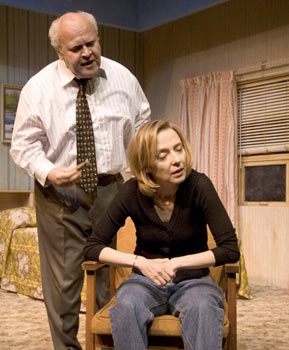|
Civilization is based on a contract. Contracts are reached through conversations that mean something to both parties and that end in an agreement. When a contract is violated and people’s talk becomes just the garbage spurting from broken hopes, it could be said the people are occupants of a suburban motel on the road that leads to the end of civilization.
George F. Walker’s brilliant play, the second of his Suburban Motel series being re-presented this season in a gripping production by Ken Gass at Factory Theatre, concerns a mature couple, Henry and Lily, whose domestic life is degenerating into a nightmare. Dennis O’Connor plays Henry, a man who is what he does. Still jobless two years after being laid off, Henry has lost the core of his being –– the respect that comes from doing a job he’s qualified for. He is trying to restore his respect situation through the relentless ‘doing’ of job-hunting. O’Connor’s Henry goes through a range of moods from hopeful to determined to bewildered to defensive, but mostly presents as a man drowning in a rage whose only viable direction is towards revenge on the system that put him here.
Lily, played by Brenda Bazinet, is a subtler, more complex character, and her performance is both solid and finely nuanced. Though she is the ‘supportive’ partner in the marriage, Lily reveals herself as the stronger one. She lacks employable skills, as Henry must remind her, but she is the survivor. The typical ‘wifie’ who has never worked outside the home, she reveals in this breadwinning crisis, that she is not what she does. She is what she wants. She wants to keep her mortgaged home and she wants to keep her children safe. To do this, she will ‘do’ anything, even prostitute herself. The dialogues between husband and wife inevitably seize up like an overheated machine because they are no longer a couple with a common purpose, and they don’t even know it. Writing and acting in these scenes are equally compelling.
The other characters are Sandy, the friendly neighbourhood hooker, played with brass and sparkle by Jody Stevens, and Walker’s comic duo of detectives, Donny and Max. They are a kind of Marat-Sade version of Wayne and Schuster, first brought into the play to interrogate Henry about Lily’s disappearance (which is only temporary), and then to sniff out a possible connection between Henry and the murders of three job-seekers like himself. Donny, the alcohol and hooker addict, has the added dimension of being hung up on Lily since high school. Without giving anything away, Donny’s motives in looking into the lives of Henry and Lily are so obviously mixed that they generate a lot of dialogue and physical antics, much of it funny in a black way, with painful results. Needless to say, David Ferry’s Donny is totally engaging. Max is solid and convincing as Donny’s straightman. Through Max, normalcy has a kind of appeal.
|

Dennis O'Connor, Brenda Bazinet |
|
As theatre, End of Civilization offers an entertaining variety of scenes in an unchanging set, arranging the characters in all the possible duos, trios, quartets and the full quintet. Steve Marsh’s sound, and especially the wakeful lighting by Peter Freund are delightful markers of scene shifts. Ken Gass’ direction seems organic to the script, bringing it alive without calling attention anywhere in particular, though I could have used a more modulated approach to the shouting and spouting that goes on with these frustrated characters.
Walker’s way of telling his story is to begin in the middle, skip back and forth till he reaches the end, then go back to the beginning to close the play. Since the innocent hopes of a situation are in its beginning, going back is a good way to bring light into a story that moves towards the darkness. The end of the play is not the end of the story. Playing with the timeline adds depth of meaning and, when it is well done, as in this case, serves to keep you perched on the edge of your attention.
|
|


